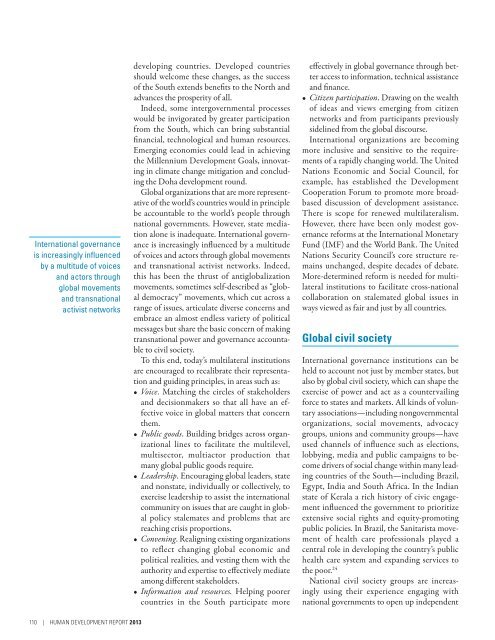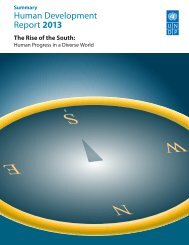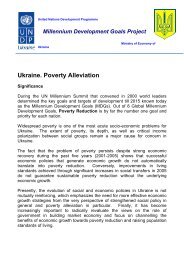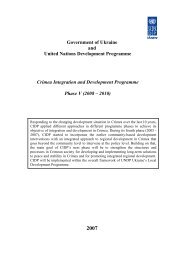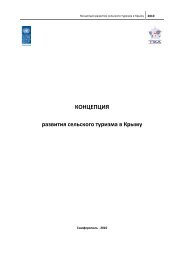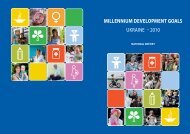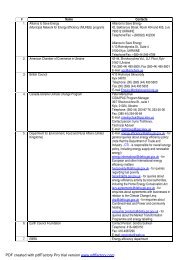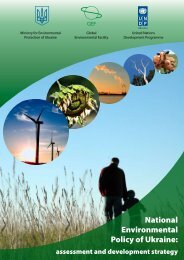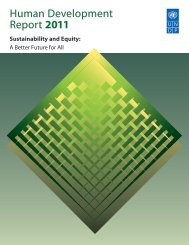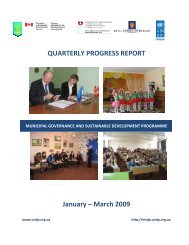E N S W - United Nations Development Programme
E N S W - United Nations Development Programme
E N S W - United Nations Development Programme
You also want an ePaper? Increase the reach of your titles
YUMPU automatically turns print PDFs into web optimized ePapers that Google loves.
International governance<br />
is increasingly influenced<br />
by a multitude of voices<br />
and actors through<br />
global movements<br />
and transnational<br />
activist networks<br />
developing countries. Developed countries<br />
should welcome these changes, as the success<br />
of the South extends benefits to the North and<br />
advances the prosperity of all.<br />
Indeed, some intergovernmental processes<br />
would be invigorated by greater participation<br />
from the South, which can bring substantial<br />
financial, technological and human resources.<br />
Emerging economies could lead in achieving<br />
the Millennium <strong>Development</strong> Goals, innovating<br />
in climate change mitigation and concluding<br />
the Doha development round.<br />
Global organizations that are more representative<br />
of the world’s countries would in principle<br />
be accountable to the world’s people through<br />
national governments. However, state mediation<br />
alone is inadequate. International governance<br />
is increasingly influenced by a multitude<br />
of voices and actors through global movements<br />
and transnational activist networks. Indeed,<br />
this has been the thrust of antiglobalization<br />
movements, sometimes self-described as “global<br />
democracy” movements, which cut across a<br />
range of issues, articulate diverse concerns and<br />
embrace an almost endless variety of political<br />
messages but share the basic concern of making<br />
transnational power and governance accountable<br />
to civil society.<br />
To this end, today’s multilateral institutions<br />
are encouraged to recalibrate their representation<br />
and guiding principles, in areas such as:<br />
• Voice. Matching the circles of stakeholders<br />
and decisionmakers so that all have an effective<br />
voice in global matters that concern<br />
them.<br />
• Public goods. Building bridges across organizational<br />
lines to facilitate the multilevel,<br />
multisector, multiactor production that<br />
many global public goods require.<br />
• Leadership. Encouraging global leaders, state<br />
and nonstate, individually or collectively, to<br />
exercise leadership to assist the international<br />
community on issues that are caught in global<br />
policy stalemates and problems that are<br />
reaching crisis proportions.<br />
• Convening. Realigning existing organizations<br />
to reflect changing global economic and<br />
political realities, and vesting them with the<br />
authority and expertise to effectively mediate<br />
among different stakeholders.<br />
• Information and resources. Helping poorer<br />
countries in the South participate more<br />
effectively in global governance through better<br />
access to information, technical assistance<br />
and finance.<br />
• Citizen participation. Drawing on the wealth<br />
of ideas and views emerging from citizen<br />
networks and from participants previously<br />
sidelined from the global discourse.<br />
International organizations are becoming<br />
more inclusive and sensitive to the requirements<br />
of a rapidly changing world. The <strong>United</strong><br />
<strong>Nations</strong> Economic and Social Council, for<br />
example, has established the <strong>Development</strong><br />
Cooperation Forum to promote more broadbased<br />
discussion of development assistance.<br />
There is scope for renewed multilateralism.<br />
However, there have been only modest governance<br />
reforms at the International Monetary<br />
Fund (IMF) and the World Bank. The <strong>United</strong><br />
<strong>Nations</strong> Security Council’s core structure remains<br />
unchanged, despite decades of debate.<br />
More-determined reform is needed for multilateral<br />
institutions to facilitate cross-national<br />
collaboration on stalemated global issues in<br />
ways viewed as fair and just by all countries.<br />
Global civil society<br />
International governance institutions can be<br />
held to account not just by member states, but<br />
also by global civil society, which can shape the<br />
exercise of power and act as a countervailing<br />
force to states and markets. All kinds of voluntary<br />
associations—including nongovernmental<br />
organizations, social movements, advocacy<br />
groups, unions and community groups—have<br />
used channels of influence such as elections,<br />
lobbying, media and public campaigns to become<br />
drivers of social change within many leading<br />
countries of the South—including Brazil,<br />
Egypt, India and South Africa. In the Indian<br />
state of Kerala a rich history of civic engagement<br />
influenced the government to prioritize<br />
extensive social rights and equity- promoting<br />
public policies. In Brazil, the Sanitarista movement<br />
of health care professionals played a<br />
central role in developing the country’s public<br />
health care system and expanding services to<br />
the poor. 24<br />
National civil society groups are increasingly<br />
using their experience engaging with<br />
national governments to open up independent<br />
110 | HUMAN DevELOPMENT REPORT 2013


